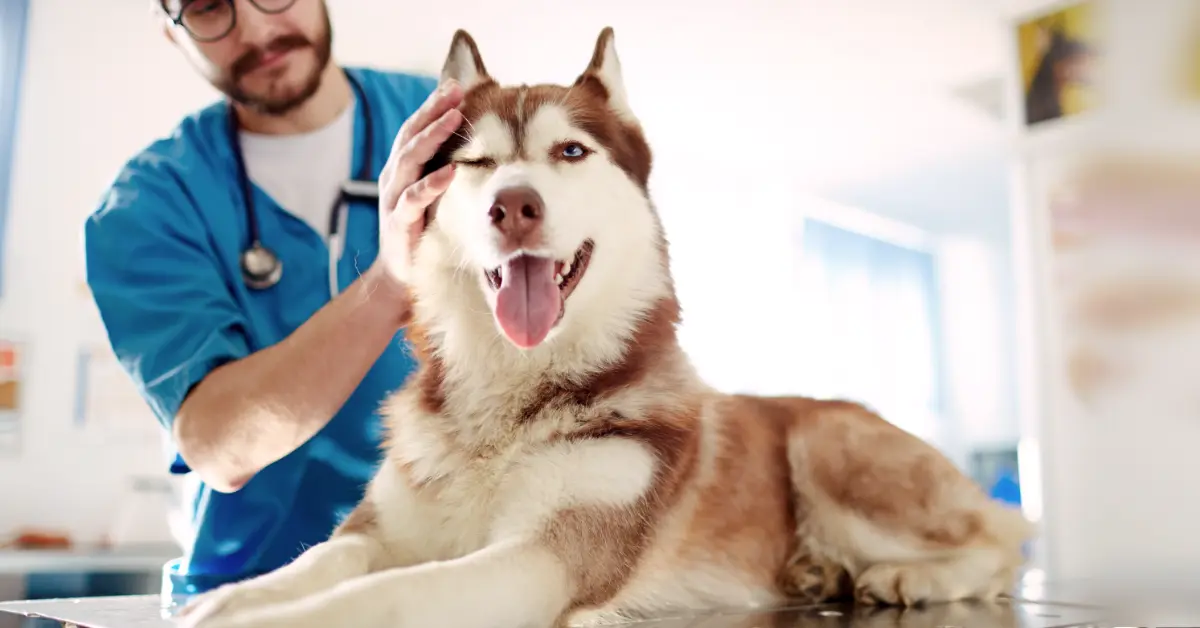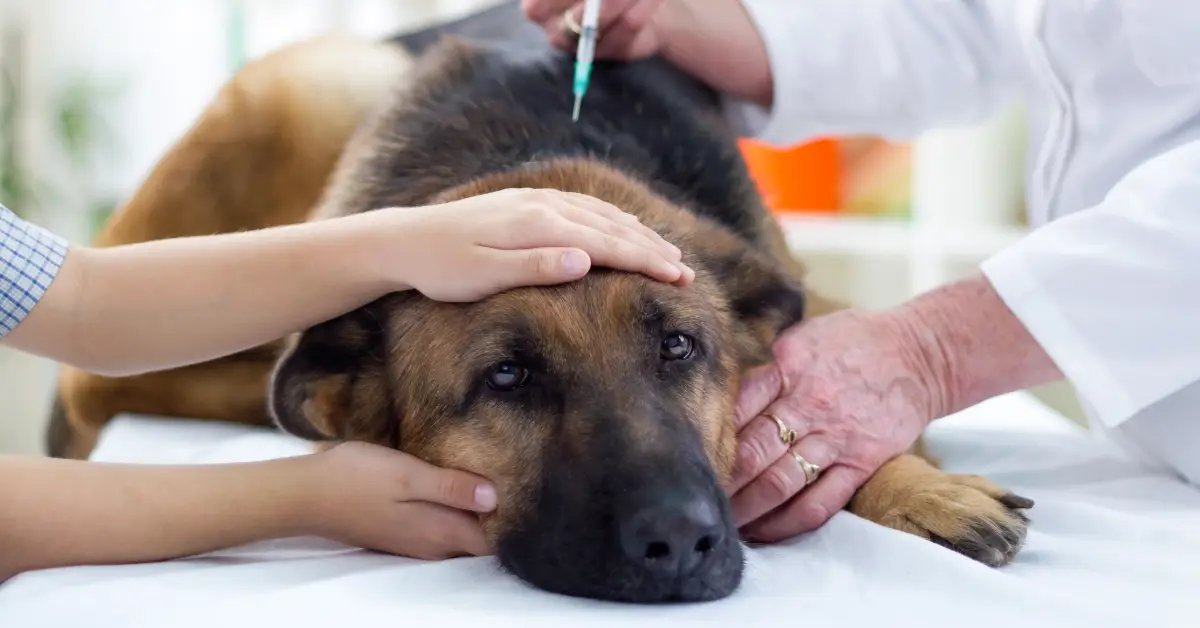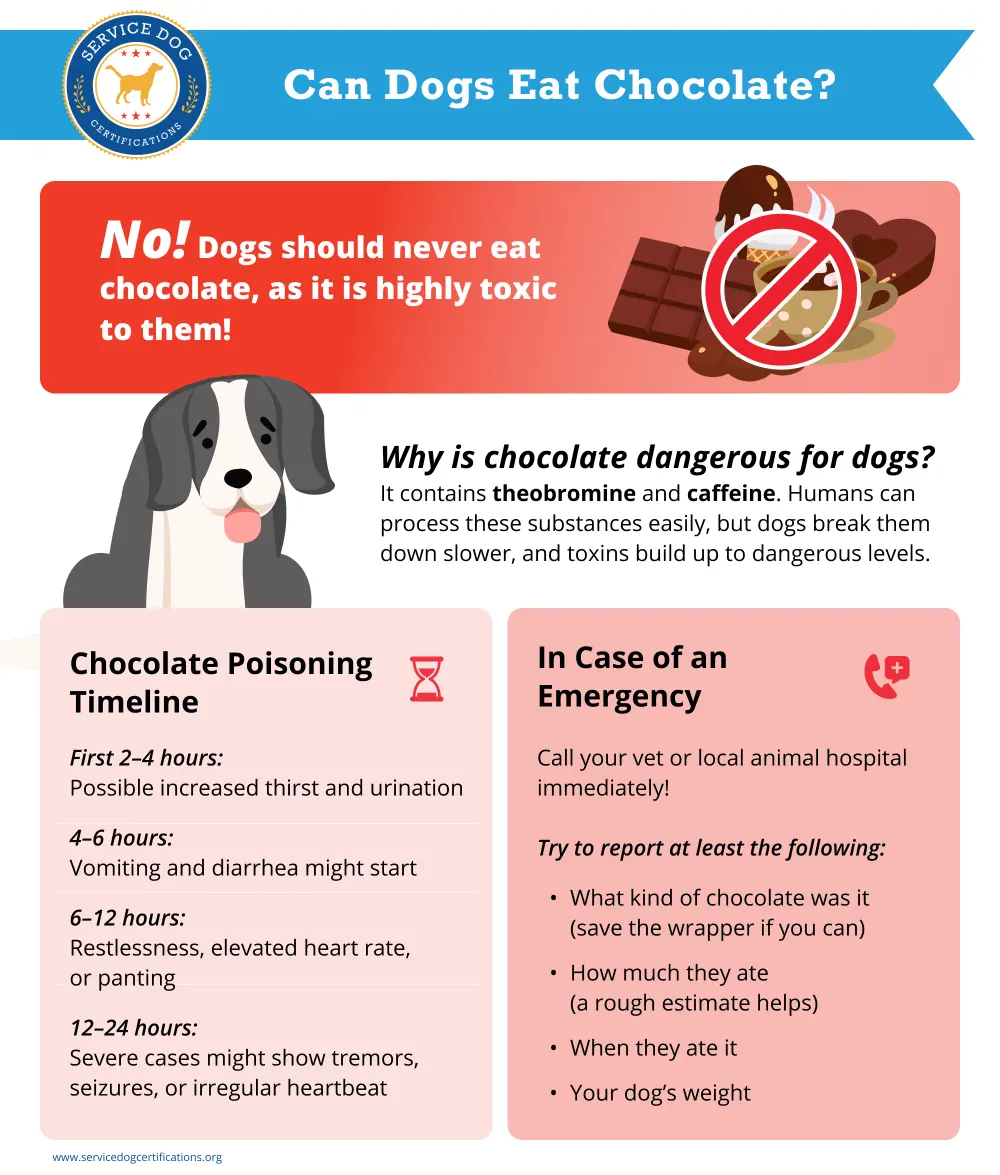Can Dogs Eat Chocolate?

No, dogs should absolutely never eat chocolate, as it is highly toxic to them! We know it can be tempting to share your chocolate treats with those puppy dog eyes staring at you, but this is one human food that should never, ever make it into your pup’s tummy.
Share this image on your site
Why is chocolate so dangerous for dogs?
Think of chocolate as a toxic bomb for dogs. It contains two major troublemakers: theobromine and caffeine. While humans can easily process these substances (lucky us!), dogs break them down way slower, allowing these toxins to build up to dangerous levels in their systems. It’s like their bodies get stuck in traffic while trying to deal with these chemicals.
Let’s break down different chocolates (from bad to worst):
- White Chocolate:
The least dangerous, but still not safe! White chocolate contains about 0.25 mg of theobromine per ounce. While the toxic risk is lower, it’s still super fatty and sugary — think upset tummy and possible pancreatitis. - Milk Chocolate:
This can cause serious issues. Milk chocolate contains 44–58 mg of theobromine per ounce. To put this in perspective, if your 20-pound dog eats a standard 3.5-ounce milk chocolate bar, they’re in the danger zone and needs immediate vet attention. - Dark Chocolate:
Now we’re in really dangerous territory. Dark chocolate contains 130–450 mg of theobromine per ounce. Even a single square of dark chocolate can be harmful to a small dog. - Baking Chocolate:
The absolute worst! Contains up to 450 mg of theobromine per ounce. Just a tiny bit can cause severe poisoning, especially in smaller dogs.
If your 30-pound Beagle snatches a 3-ounce bar of dark chocolate. That’s an emergency vet visit, no questions asked. Or your 10-pound Chihuahua licks up some hot cocoa — yep, that’s also a vet emergency. Chocolate-covered coffee beans are a double whammy because of the added caffeine!

Chocolate Poisoning Timeline
If your dog eats chocolate, here’s what might happen and when:
- First 2–4 hours: You might notice increased thirst and urination
- 4–6 hours: Vomiting and diarrhea might start
- 6–12 hours: Watch for restlessness, elevated heart rate, or panting
- 12–24 hours: More severe cases might show tremors, seizures, or irregular heartbeat
If there is an emergency, don’t wait and see! Call your vet or the local animal hospital immediately! Try to report at least the following points:
- What kind of chocolate was it (save the wrapper if you can)
- How much they ate (even a rough estimate helps)
- When they ate it
- Your dog’s weight
Remember, even if your dog has eaten chocolate before and seemed fine, that doesn’t mean they’re immune! Each exposure is dangerous and can have different effects. The best love you can show your furry friend is keeping chocolate completely off their menu.
Here’s a handy tip: Save your vet’s emergency number and a local animal hospital with after-hours hours in your phone right now. It’s better to have them and never actually need them than to frantically search for them during an emergency!
Frequently Asked Questions
- What about chocolate-flavored dog treats?
- Dog products labeled “chocolate flavor” are usually safe — they use carob or other dog-safe ingredients
- Hot chocolate mix is dangerous — it contains real cocoa
- Chocolate ice cream contains real chocolate and is unsafe
- “Chocolate” cereal usually doesn’t contain enough real chocolate to be toxic, but it still isn’t good for dogs. You should avoid it; it’s better to be safe than sorry!
- Can I train my dog not to eat chocolate?
While you can teach “leave it” commands, never test this with real chocolate. Dogs can’t understand that something that smells good could hurt them. The safest approach is prevention. - Does chocolate poisoning build up over time?
No, each exposure is separate, but multiple exposures in a short period can be more dangerous as the toxins might not be fully cleared from their system.
About the Author: The writing team at Service Dog Certifications is made up of folks who really know their stuff when it comes to disability laws and assistance animals. Many of our writers and editors have service dogs themselves and share insights from their own experiences. All of us have a passion for disability rights and animals.
Related Articles

Benefits of a Raw Food Diet for Dogs
Diet is a very important part of keeping your dog healthy. There have been many articles about dog food made in China that had harmful ingredients. A raw food diet is the most natural and healthiest way to feed your favorite canine. Here are a few arguments about feeding your dog a raw food diet. […]

Read More

Can You Deduct Service Dog Veterinary Bills on Your Taxes?
Yes, service dog vet bills are tax-deductible medical expenses. Food, grooming, training costs, and equipment all qualify, too. The only catch is that your dog needs to be an actual working service dog. Expenses for regular pets and emotional support animals don’t count, no matter how much comfort your animal provides. The government wants proof […]

Read More

Should I Vaccinate My Service Dog?
Yes, you should vaccinate your service dog, as they are required by many state and local laws to be vaccinated, just like a pet dog. Additionally, vaccinations like rabies are required for air travel. Just because your dog is a service dog does not exempt them from vaccinations, unlike it does for pet fees and […]

Read More
